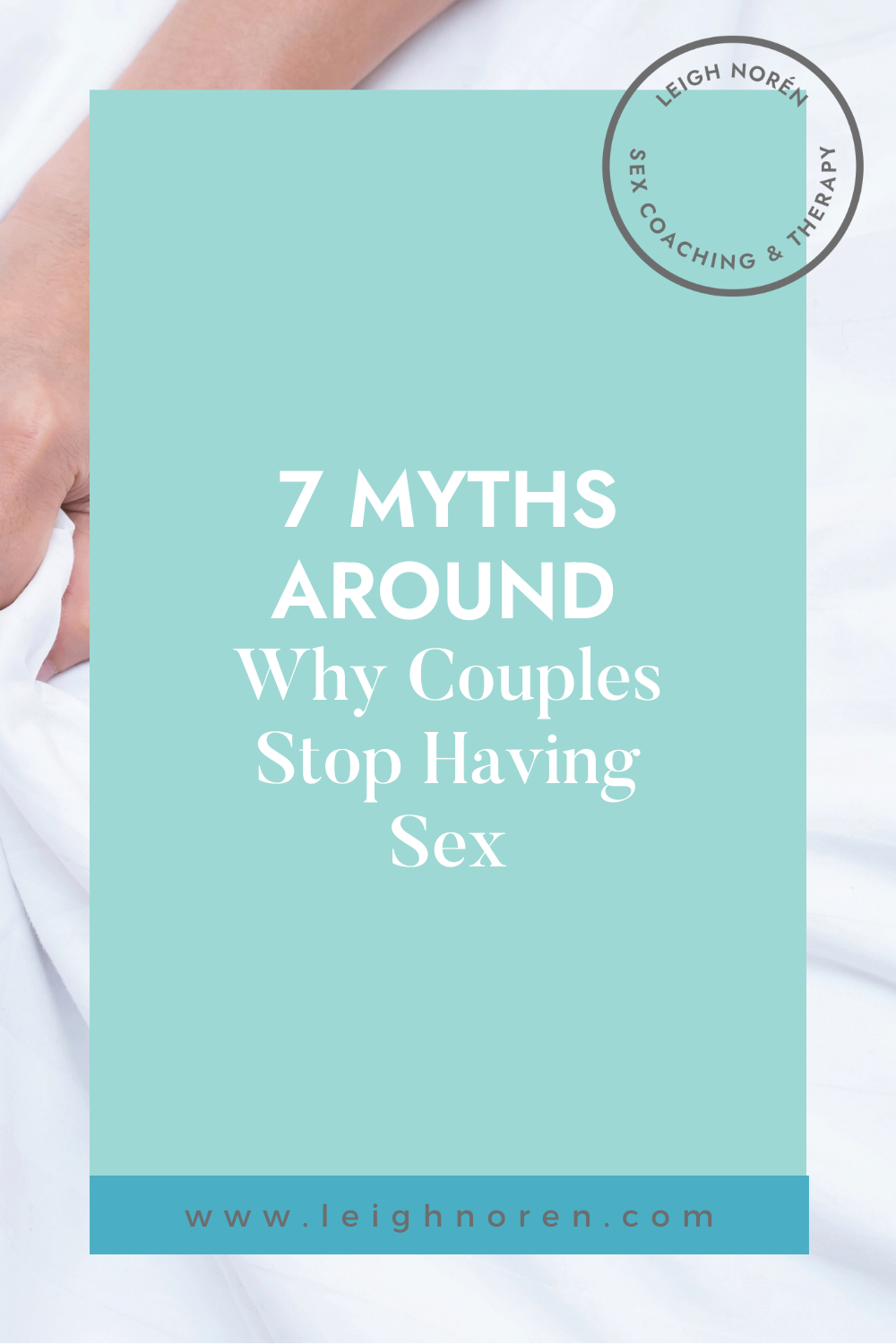7 Common Misconceptions About Why Couples Stop Having Sex
First published 22st March, 2022. Updated 31th March, 2025.
7 min read
Sex can be the spark that keeps your relationship alive. This is why, when sexual intimacy fades, it can leave you questioning your entire relationship. But don’t worry—even though sex can be a barometer of relationship health, it’s actually a bit of a myth. Here are some of the biggest misconceptions about why couples stop having sex (and the real reasons behind them).
7 Myths About Why Couples Stop Having Sex
1. If You’re Not Having Sex, You’re Not In Love Anymore
Many people believe that love and libido should always go hand in hand. So if sex becomes rare, surely your love must be fading too, right? Not exactly.
Sexual desire isn’t like hunger or thirst—it’s an emotion that’s influenced by many different things.
Before you start worrying, take a step back and consider what might be affecting your or your partner’s sex drive. For instance, it could be:
- Physical changes, like hormonal shifts or chronic pain
- Mental health struggles, such as anxiety, insecurity, or depression
- Relationship dynamics, including unresolved conflicts or emotional distance
Once you realise how complex desire really is, you’ll see that a lower libido doesn’t have to mean love is gone. More often than not, there’s something else going on beneath the surface, impacting how you feel about your partner sexually.
2. A Sexless Relationship Means It’s Over
It’s easy to assume that if you’re not having sex—your relationship is doomed. But as a sex therapist specialized in low desire, I can tell you that’s not always the case.
In fact, many couples who go through dry spells still have a deep emotional connection. Because a lack of sex isn’t necessarily a sign that things are falling apart—it’s often simply a clue that there’s something that needs attention.
At the start of a relationship, everything feels electric. You can’t keep your hands off of each other, and every single second together feels like bliss. That’s the magic of infatuation—it’s like a rush that fuels your desire effortlessly. There’s no work to put in to want your partner that way, it just happens.
But around the 6-month to 2.5-year mark, sexual excitement dips—and our relationship starts to revolve more around emotional intimacy rather than just physical attraction.
If your sex drive has slowed down, it might actually be a sign of security and deep love, not disaster.
This, however, doesn’t mean that you can’t rekindle desire once you’re in the attachment phase. It’s possible to have both! One way to regain your desire is through Re.Desire, an online program designed to help couples take the pressure off sex and rebuild intimacy through a step-by-step process.
3. Having Kids Kills Your Sex Life
Sure, having kids can certainly put a damper on your sex life. Spit-up and dirty nappies aren’t exactly well-known aphrodisiacs. But this doesn’t mean your sex life has to be put on hold till your babies are teenagers.
Yes, raising children brings new challenges—sleepless nights, a total lack of personal space, and catering to someone else’s needs 24/7. But many couples find ways to keep intimacy alive. The key is figuring out what works for you.
Perhaps you’re the partner who doesn’t want sex—or maybe you’re both disinterested in it right now. The real issue here isn’t how much sex you’re having, but rather, whether you want to rekindle that part of your relationship.
A lot of couples feel they want to have more sex because they feel like they should be having more. Because that’s what “happy couples” do. But it’s completely okay to not want sex for the time-being. The most important thing is that you decide what you want first.
And if you decide you want to get back to having fun in the sheets, it’s time to explore what’s changed and what you both need moving forward. Because an active and fulfilling sex life is totally possible after having kids—but it might need to look different than things did before they came along.
WANT YOUR SEX DRIVE BACK?

My free resource The Desire Test helps you take that first step towards an increased sex drive, by understanding your decreased desire.
Take the 10-page assessment quiz, get the answers you need to understand what’s standing in the way of your desire, and get free sex and relationship tips directly to your inbox. You can unsubscribe at any time.
4. Women Don’t Care About Sex
This is probably one of the oldest and most frustrating misconceptions out there about sex. And one that wholeheartedly isn’t true.
Historically, we looked at men and women as equally sexual. But as we entered the 19th century, these societal ideas about gender shifted. Women were now painted as either morally pure or uninterested in sex. And this narrative doesn’t reflect reality.
The idea that women don’t enjoy sex is also often based on a limited definition of what sex even is—one that prioritises penetration over other types of pleasure.
The truth?
Many women (and people with vulvas) don’t orgasm from penetration alone. They often need external clitoral stimulation. So if a woman seems uninterested in sex, it’s worth begging the question—does she not want sex, or is shesimply not enjoying the kinds of sex she’s having?
Because nothing kills desire faster than sex that isn’t pleasurable.
5. Getting Older Means Losing Your Libido
A lot of people want to know the average age that couples stop having intercourse and other types of sex. But while ageing brings about changes in sexual health—it’s not about a specific age where sex suddenly stops or isn’t possible. And you don’t need to resign yourself to a life without sex just because you’re getting older.
Yes, menopause, erectile unpredictability or shifts in hormone levels can all impact sexual response, but they don’t have to erase desire. In fact, believing this myth can do more harm than the actual ageing process itself.
Through my years working in the field of sex therapy, I’ve seen firsthand how much sex and intimacy means to people of all ages. That it can bring so much joy and excitement to your life, regardless of the number on your driver’s license.
The key in keeping your sex life active and exciting throughout the years is adapting and being open to what feels good at different stages. For instance, vaginal penetration may be more difficult to achieve if you can’t get or maintain an erection, but this doesn’t mean you can’t still receive manual or oral pleasure.
So if you’ve been wondering at what age couples stop making love, the answer isn’t a number, but rather, that ageing bodies require a more flexible approach to sex. Because sex isn’t an activity for the young—couples continue being sexually active well into their later years (as they should, if that’s what they want!).
6. Men Need New Partners To Stay Interested In Sex
It’s easy to blame low desire on familiarity. And yes, novelty can play a role in attraction. But the idea that men are biologically wired to lose interest in long-term partners? That’s simply not true.
Interestingly, research suggests that novelty may actually be more important for women’s desire than men’s. In his book What Do Women Want?, Daniel Bergner found that women may actually crave new experiences more than men.
So if desire has dipped, the answer isn’t necessarily a new partner—it’s exploring new experiences with the one you have.
7. Long-Term Relationships Can’t Stay Passionate
It’s a common fear—after years (or decades) together, that passion simply cannot stay alive. But it can.
Expecting sex to always happen spontaneously or assuming your desire won’t change over time sets unrealistic expectations.
Sexuality evolves.
What once excited you may not anymore—and that’s normal. Instead of seeing this as a loss, see it as an opportunity. What excites you now? What would make you feel more connected to your partner on an intimate level?
And if you’re asking yourself, do married couples stop making love? Because the truth is, great sex throughout the years isn’t about it simply “flowing”. It’s about communication, connection, and making intimacy a priority in a way that works for both partners.
This doesn’t mean you have to add sex to your Google Calendar for it to happen—scheduling sex does not work for everyone. But it does mean being intentional about how you spend your time together.
How Sexual Myths Affect Relationships
At the start of a relationship, sex often feels effortless. But over time, life gets busier, stress builds, and intimacy can become all too complicated.
if you’ve ever wondered, why do couples stop having sex? or how long is too long without intimacy?, it’s worth paying attention to the myths you’ve been told about sex.
Because more often than not, your beliefs cause more harm than the realities of ageing, life transitions, or your gender do. A sizzling sex life is possible—for you, too.
Want to rediscover desire? The first step is understanding what’s getting in the way. Download my free guide, The Desire Test to learn more about your own libido and how to rebuild intimacy. This resource is grounded in sexological science and my experience as a therapist and coach.

Zero sex drive?
You’re not alone! Download the 10-page Desire Test to find out why your desire for sex is gone (and what to do about it).
Questions based on a variety of factors proven to negatively affect desire
Find out which factors are responsible for your low or non-existent sex drive
Get instant access to expert advice, delivered directly to your inbox when you download The Desire Test. Unsubscribe anytime.
WANT TO KNOW MORE ABOUT THE DESIRE TEST?
With 9 years of experience as a sex therapist and coach - Leigh helps her clients create stress-free, shame-free, pressure-free sex lives, through her unique combination of sexological science, & psychotherapeutic & coaching tools.
OTHER POSTS YOU MIGHT ENJOY
Copyright © 2019-2026 Leigh Norén. All Rights Reserved. | Website by Pinegate Road
Cookie policy | Terms & Conditions | Privacy Policy


